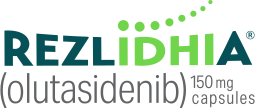
REZLIDHIA (olutasidenib) is an oral medication designed to treat acute myeloid leukemia (AML) in adults with a specific genetic mutation known as an IDH1 mutation. This drug is particularly used for patients whose disease has relapsed or who have not responded to other treatments. REZLIDHIA works by inhibiting the IDH1 enzyme, which in its mutated form contributes to the growth and survival of cancer cells. By targeting this enzyme, REZLIDHIA helps to reduce the production of an oncometabolite that promotes cancer cell growth, thereby aiding in the differentiation of cells and potentially leading to the restoration of normal blood cell function. This targeted approach offers a treatment option that can be critical for patients with this challenging form of leukemia who have limited treatment options.
Acute Myeloid Leukemia (AML) is a type of cancer that originates in the bone marrow and rapidly progresses, affecting the blood and other tissues. AML is characterized by the abnormal proliferation of myeloid cells, which are a type of white blood cell. These immature cells, known as blasts, accumulate in the bone marrow and interfere with the production of normal blood cells. This disruption leads to symptoms such as fatigue, frequent infections, easy bruising or bleeding, and anemia. AML is the most common acute leukemia in adults, with the incidence increasing with age.
The cause of AML is not fully understood, but several risk factors have been identified, including genetic mutations, previous chemotherapy or radiation therapy, exposure to certain chemicals, and smoking. Treatment typically involves intensive chemotherapy to induce remission, followed by consolidation therapy to eliminate residual disease. In some cases, a stem cell transplant may be recommended. The prognosis for AML varies based on factors such as patient age, overall health, and specific genetic mutations present in the leukemia cells.
Companion diagnostic testing plays a critical role in the decision to treat acute myeloid leukemia (AML) with REZLIDHIA (olutasidenib). This targeted therapy is specifically designed for AML patients who have an isocitrate dehydrogenase-1 (IDH1) mutation. The presence of this mutation can be identified using companion diagnostic tests, which are essential before starting treatment with REZLIDHIA.
The testing involves analyzing the patient’s cancer cells to detect the IDH1 mutation, typically through methods such as next-generation sequencing (NGS) or other molecular diagnostic techniques. Confirming the presence of an IDH1 mutation ensures that REZLIDHIA, which specifically inhibits the mutant IDH1 enzyme, is used for patients most likely to benefit from its mechanism of action. This precision medicine approach allows for more effective and personalized treatment strategies, directly targeting the genetic abnormalities driving the cancer’s growth and progression.

This companion diagnostic was developed by an IVD manufacturer as a kit. This is a valid FDA approved test if utilized by 3rd party diagnostic labs who have validated the test using the kit on the specified platform. It is not directly orderable from the manufacturer.
REZLIDHIA (olutasidenib) is a medication used to treat adults with acute myeloid leukemia (AML) who have a specific genetic mutation known as IDH1. It works by inhibiting the mutated IDH1 enzyme, which is involved in the metabolic processes of cancer cells. By targeting this enzyme, REZLIDHIA helps to decrease the production of cancer-promoting metabolites, potentially leading to the reduction of cancer cells and the restoration of normal blood cell function.
REZLIDHIA is intended for AML patients who have relapsed or are refractory to other treatments and have an IDH1 mutation in their cancer cells. It is crucial for patients to have their IDH1 mutation status confirmed through diagnostic testing before starting treatment with REZLIDHIA.
REZLIDHIA offers a targeted therapeutic approach for patients with IDH1-mutated AML, providing a potential treatment option where few may exist. It has been shown to help achieve remission and reduce the burden of disease in some patients, thereby improving treatment outcomes in a population with challenging prognoses.
Common side effects of REZLIDHIA include fatigue, joint pain, skin rash, nausea, and fever. Some patients may experience more serious side effects such as differentiation syndrome, a life-threatening condition that requires immediate medical attention. It is important for patients to monitor their health and report any unusual symptoms to their healthcare provider.
REZLIDHIA is taken orally in tablet form. The specific dosage and treatment regimen depend on the patient’s overall health, response to the medication, and other factors as determined by their healthcare provider. Continuous monitoring and adjustments may be necessary based on how well the patient tolerates the treatment.
Companion diagnostic testing is crucial to determine if a patient’s AML cells carry the IDH1 mutation, which REZLIDHIA targets. This testing ensures that the medication is appropriate and likely to be effective, helping to personalize treatment plans and improve the chances of successful outcomes by matching patients with the therapy most likely to benefit them.

Rigel Pharmaceuticals, Inc. (Nasdaq: RIGL) is a biotechnology company dedicated to discovering, developing and providing novel therapies that significantly improve the lives of patients with hematologic disorders and cancer. Founded in 1996, Rigel is based in South San Francisco, California. For more information on Rigel, the Company’s marketed products and pipeline of potential products, visit www.rigel.com.